深港版小学英语五年级上下基本知识_主要词汇及句型[1]1
- 格式:doc
- 大小:836.00 KB
- 文档页数:56
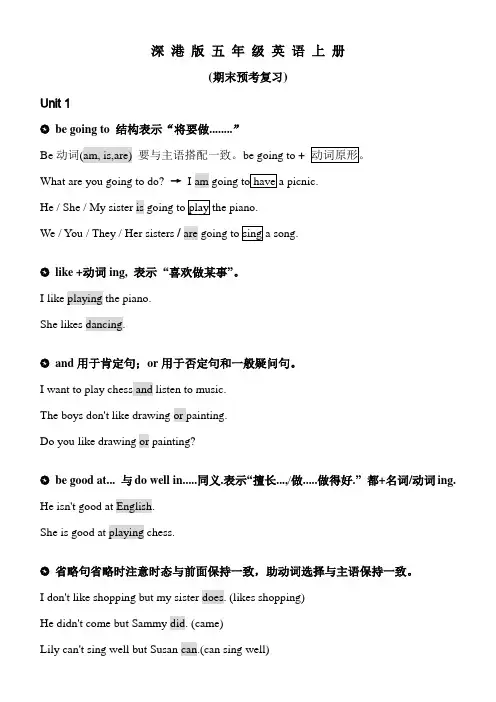
深港版五年级英语上册(期末预考复习)Unit 1✪be going to 结构表示“将要做........”Be动词(am, is,are) 要与主语搭配一致。
be going to + 动词原形。
What are you going to do? →I am going to have a picnic.He / She / My sister is going to play the piano.We / You / They / Her sisters / are going to sing a song.✪like +动词ing, 表示“喜欢做某事”。
I like playing the piano.She likes dancing.✪and用于肯定句;or用于否定句和一般疑问句。
I want to play chess and listen to music.The boys don't like drawing or painting.Do you like drawing or painting?✪be good at...与do well in.....同义.表示“擅长...,/做.....做得好.”都+名词/动词ing. He isn't good at English.She is good at playing chess.✪省略句省略时注意时态与前面保持一致,助动词选择与主语保持一致。
I don't like shopping but my sister does. (likes shopping)He didn't come but Sammy did. (came)Lily can't sing well but Susan can.(can sing well)Unit 2✪祈使句是表示请求,命令,劝告或建议的句子。
其主语一般为第二人称,但省略不用。
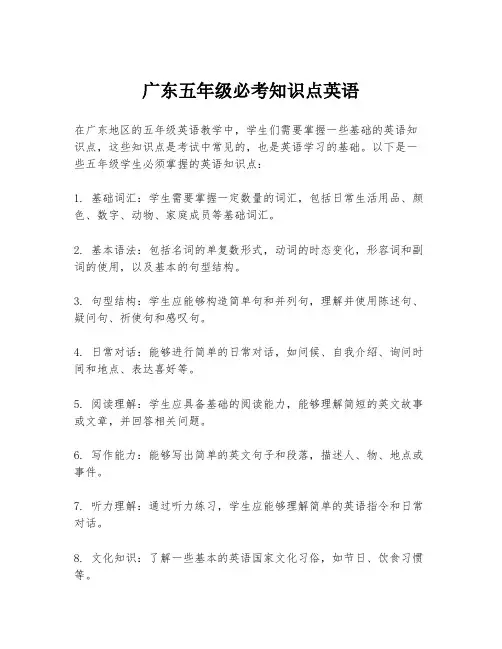
广东五年级必考知识点英语
在广东地区的五年级英语教学中,学生们需要掌握一些基础的英语知识点,这些知识点是考试中常见的,也是英语学习的基础。
以下是一些五年级学生必须掌握的英语知识点:
1. 基础词汇:学生需要掌握一定数量的词汇,包括日常生活用品、颜色、数字、动物、家庭成员等基础词汇。
2. 基本语法:包括名词的单复数形式,动词的时态变化,形容词和副词的使用,以及基本的句型结构。
3. 句型结构:学生应能够构造简单句和并列句,理解并使用陈述句、疑问句、祈使句和感叹句。
4. 日常对话:能够进行简单的日常对话,如问候、自我介绍、询问时间和地点、表达喜好等。
5. 阅读理解:学生应具备基础的阅读能力,能够理解简短的英文故事或文章,并回答相关问题。
6. 写作能力:能够写出简单的英文句子和段落,描述人、物、地点或事件。
7. 听力理解:通过听力练习,学生应能够理解简单的英语指令和日常对话。
8. 文化知识:了解一些基本的英语国家文化习俗,如节日、饮食习惯等。
9. 语音和发音:掌握英语的基本发音规则,能够正确发音单词和句子。
10. 词汇运用:能够在不同的语境中正确使用词汇,包括同义词和反
义词的运用。
结尾:
掌握这些知识点不仅能够帮助学生在考试中取得好成绩,更能为他们
的英语学习打下坚实的基础。
家长和老师应鼓励学生通过多种方式学
习英语,如阅读英文书籍、观看英语节目、参与英语角等,以提高他
们的语言运用能力。
记住,学习英语是一个长期的过程,需要持续的
努力和实践。
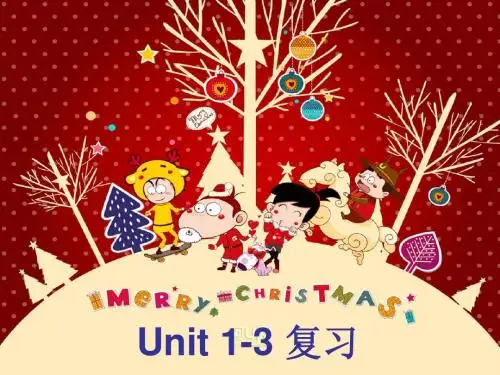
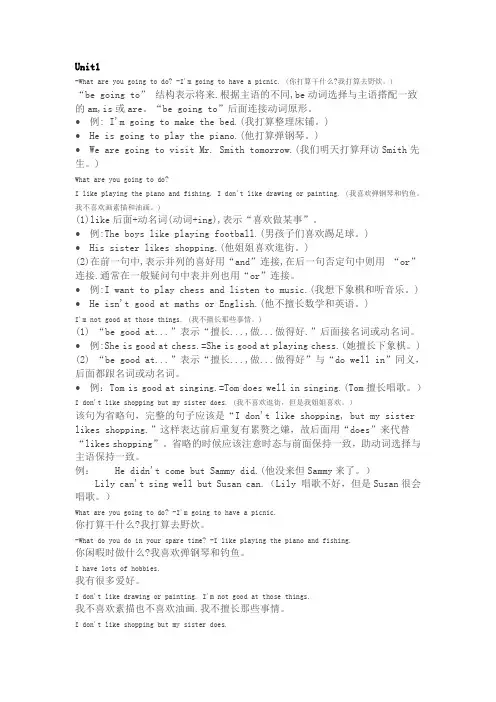
Unit1-What are you going to do? -I'm going to have a picnic. (你打算干什么?我打算去野炊。
)“be going to” 结构表示将来.根据主语的不同,be动词选择与主语搭配一致的am,is或are。
“be going to”后面连接动词原形。
•例: I'm going to make the bed.(我打算整理床铺。
)• He is going to play the piano.(他打算弹钢琴。
)• We are going to visit Mr. Smith tomorrow.(我们明天打算拜访Smith先生。
)What are you going to do?I like playing the piano and fishing. I don't like drawing or painting. (我喜欢弹钢琴和钓鱼。
我不喜欢画素描和油画。
)(1)like后面+动名词(动词+ing),表示“喜欢做某事”。
•例:The boys like playing football.(男孩子们喜欢踢足球。
)• His sister likes shopping.(他姐姐喜欢逛街。
)(2)在前一句中,表示并列的喜好用“and”连接,在后一句否定句中则用“or”连接.通常在一般疑问句中表并列也用“or”连接。
•例:I want to play chess and listen to music.(我想下象棋和听音乐。
) • He isn't good at maths or English.(他不擅长数学和英语。
)I'm not good at those things. (我不擅长那些事情。
)(1) “be good at...”表示“擅长...,做...做得好.”后面接名词或动名词。
•例:She is good at chess.=She is good at playing chess.(她擅长下象棋。
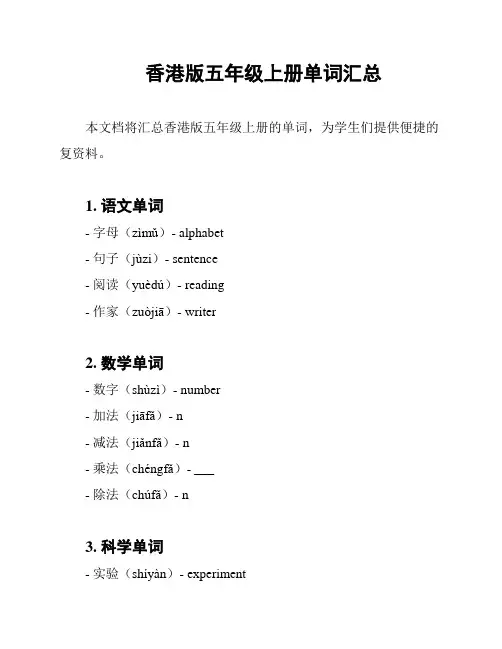
香港版五年级上册单词汇总本文档将汇总香港版五年级上册的单词,为学生们提供便捷的复资料。
1. 语文单词- 字母(zìmǔ)- alphabet- 句子(jùzi)- sentence- 阅读(yuèdú)- reading- 作家(zuòjiā)- writer2. 数学单词- 数字(shùzì)- number- 加法(jiāfǎ)- n- 减法(jiǎnfǎ)- n- 乘法(chéng fǎ)- ___- 除法(chúfǎ)- n3. 科学单词- 实验(shíyàn)- experiment- 观察(guān chá)- n- 化学(huàxué)- chemistry - 物理(wùlǐ)- physics- 地球(dìqiú)- Earth4. 历史单词- 皇帝(huángdì)- emperor - 文化(wénhuà)- culture- 历史(lìshǐ)- history- 文明(wénmíng)- n- 社会(shèhuì)- society5. 英语单词- Hello(hēlǒ)- 你好- Goodbye(gūbài)- 再见- Thank you(tèngkènǐ)- 谢谢- Excuse me(jièguò)- 对不起- Sorry(bàoqiàn)- 抱歉6. 音乐单词- 音符(yīn fú)- note- 旋律(xuán lǜ)- melody- 节奏(jiézòu)- rhythm- 乐器(yuèqì)- musical instrument- 歌曲(gēqǔ)- song这些单词是香港版五年级上册中的重要词汇,希望能够帮助同学们快速记忆和掌握。
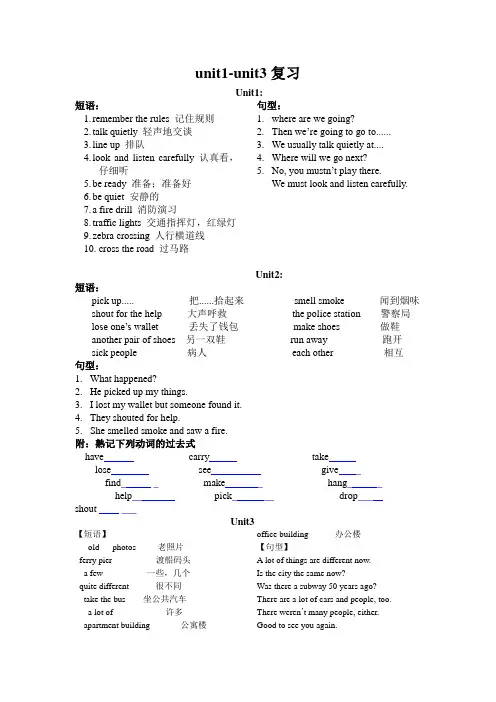
unit1-unit3复习Unit1:短语:1.remember the rules 记住规则2.talk quietly 轻声地交谈3.line up 排队4.look and listen carefully 认真看,仔细听5.be ready 准备;准备好6.be quiet 安静的7.a fire drill 消防演习8.traffic lights 交通指挥灯,红绿灯9.zebra crossing 人行横道线10.cross the road 过马路句型:1.where are we going?2.Then we’re going to go to......3.We usually talk quietly at....4.Where will we go next?5.No, you mustn’t play there.We must look and listen carefully. Unit2:短语:pick up..... 把......拾起来smell smoke 闻到烟味shout for the help 大声呼救the police station 警察局lose one’s wallet 丢失了钱包make shoes 做鞋another pair of shoes 另一双鞋run away 跑开sick people 病人each other 相互句型:1.What happened?2.He picked up my things.3.I lost my wallet but someone found it.4.They shouted for help.5.She smelled smoke and saw a fire.附:熟记下列动词的过去式have__ carry___ __take___ __ lose___ ____see________ give__ __ find______ _ make____ ___hang_______ help_____ ___pick____ ____ drop____shout ____ ___Unit3【短语】old photos 老照片ferry pier 渡船码头a few 一些,几个quite different 很不同take the bus 坐公共汽车a lot of 许多apartment building 公寓楼office building 办公楼【句型】A lot of things are different now.Is the city the same now?Was there a subway 50 years ago? There are a lot of cars and people, too. There weren’t many people, either. Good to see you again.【语法】1.must “必须,应该,一定,准是”, 表示说话人认为有必要做某事, 命令, 要求别人做某事以及对事物的推测。
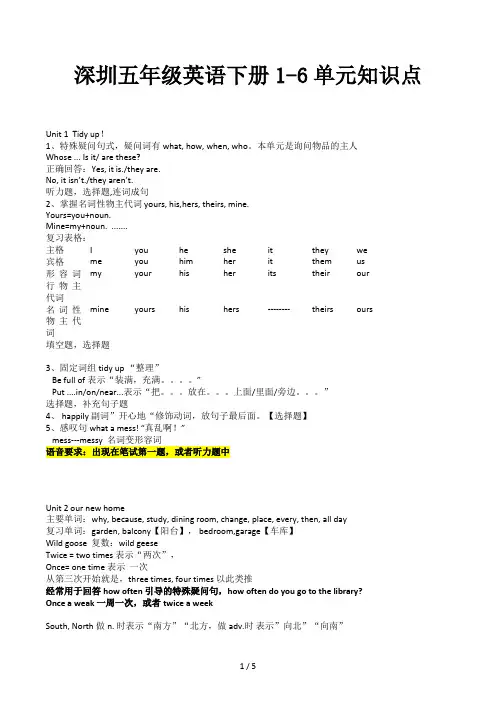
深圳五年级英语下册1-6单元知识点Unit 1 Tidy up!1、特殊疑问句式,疑问词有what, how, when, who。
本单元是询问物品的主人Whose ... Is it/ are these?正确回答:Yes, it is./they are.No, it isn’t./they aren’t.听力题,选择题,连词成句2、掌握名词性物主代词 yours, his,hers, theirs, mine.Yours=you+noun.Mine=my+noun. .......复习表格:主格I you he she it they we宾格me you him her it them usmy your his her its their our形容词行物主代词mine yours his hers -------- theirs ours名词性物主代词填空题,选择题3、固定词组tidy up “整理”Be full of 表示“装满,充满。
”Put ....in/on/near...表示“把。
放在。
上面/里面/旁边。
”选择题,补充句子题4、 happily 副词”开心地“修饰动词,放句子最后面。
【选择题】5、感叹句what a mess! “真乱啊!”mess---messy 名词变形容词语音要求:出现在笔试第一题,或者听力题中Unit 2 our new home主要单词:why, because, study, dining room, change, place, every, then, all day复习单词:garden, balcony【阳台】, bedroom,garage【车库】Wild goose 复数:wild geeseTwice = two times 表示“两次”,Once= one time 表示一次从第三次开始就是,three times, four times 以此类推经常用于回答how often 引导的特殊疑问句,how often do you go to the library?Once a weak 一周一次,或者twice a weekSouth, North 做n. 时表示“南方”“北方,做adv.时表示”向北”“向南”同样,east, west ,表示“在南方”用介词in选择题1、主要句型:特殊疑问句Why do you like it? Why表示“为什么”,询问他人做某事的原因和理由。
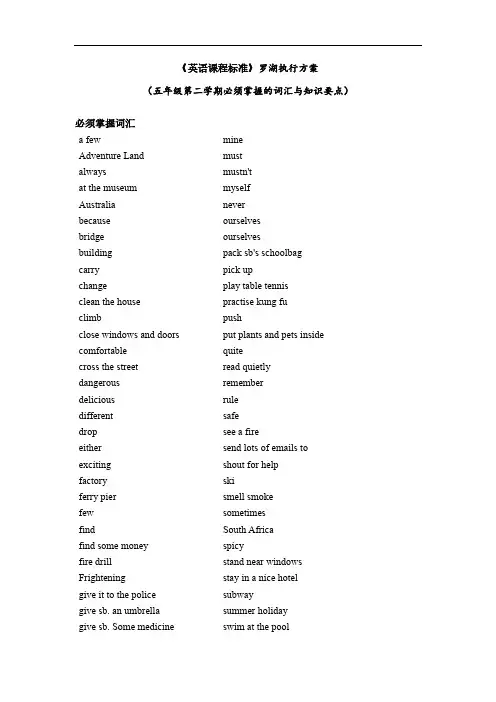
《英语课程标准》罗湖执行方案(五年级第二学期必须掌握的词汇与知识要点)必须掌握词汇a few mineAdventure Land mustalways mustn'tat the museum myselfAustralia neverbecause ourselvesbridge ourselvesbuilding pack sb's schoolbagcarry pick upchange play table tennisclean the house practise kung fuclimb pushclose windows and doors put plants and pets inside comfortable quitecross the street read quietlydangerous rememberdelicious ruledifferent safedrop see a fireeither send lots of emails toexciting shout for helpfactory skiferry pier smell smokefew sometimesfind South Africafind some money spicyfire drill stand near windows Frightening stay in a nice hotelgive it to the police subwaygive sb. an umbrella summer holidaygive sb. Some medicine swim at the poolgo inside take a man's armgo outside talk loudlyhang up the clothes talk quietlyhappen taxiharbour Thailandhave a fever the Great Wallhave a headache the sameherself theirsherself themselveshighway tiringhimself tunnelhis typhoonhome phone use mobile phoneits usuallylate visit family and friends learn walk quicklyleave … outside walk slowlyline up whylisten carefully win a prizelisten to the radio write a letter tolose a Discman Xi'anlose a wallet yoursmake a model yourselfmake lunch for yourselvesmake the bed必须掌握知识要点First, we’re going to go to….We usually talk quietly at the library.Can I…?No, you mustn’t.What happened?I dropped my bag. He picked up my things.He smelled smoke. She saw a fire. They shouted for help. Was there a subway 50 years ago?No, there wasn’t./Yes, there was. Were there many people 50 years ago? Yes, there were. /No, there weren’t.Is the city the same now?What did you do last week?I read a book. .I won a prize.I/He/She cleaned my/his/her room.I/He/She did it myself/himself/herself. There’s going to be a storm.Go inside. It’s safe.Don’t go outside.They left them outside.I am going to go to Australia.I’m going to ski there.That’s exciting.I’m going to stay at a nice hotel. That’s comfortable.The food is spicy and delicious.。
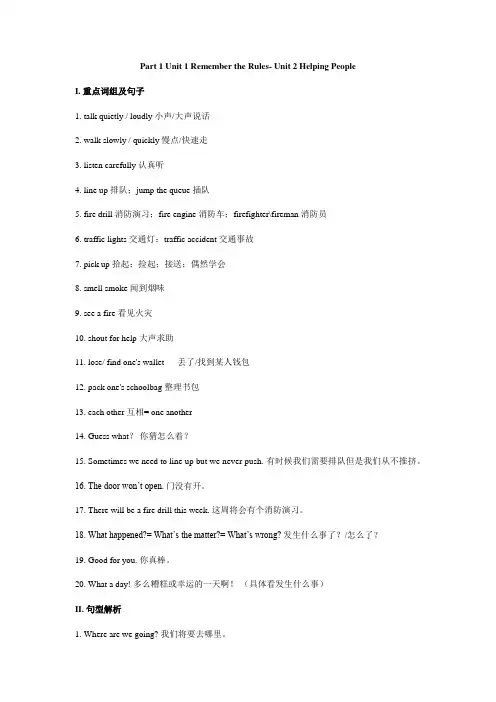
Part 1 Unit 1 Remember the Rules- Unit 2 Helping PeopleI. 重点词组及句子1. talk quietly / loudly小声/大声说话2. walk slowly / quickly慢点/快速走3. listen carefully 认真听4. line up 排队;jump the queue 插队5. fire drill消防演习;fire engine 消防车;firefighter\fireman 消防员6. traffic lights交通灯;traffic accident 交通事故7. pick up拾起;捡起;接送;偶然学会8. smell smoke闻到烟味9. see a fire 看见火灾10. shout for help 大声求助11. lose/ find one's wallet 丢了/找到某人钱包12. pack one's schoolbag整理书包13. each other互相= one another14. Guess what?你猜怎么着?15. Sometimes we need to line up but we never push. 有时候我们需要排队但是我们从不推挤。
16. The door won’t open.门没有开。
17. There will be a fire drill this week. 这周将会有个消防演习。
18. What happened?= What’s the matter?= What’s wrong?发生什么事了?/怎么了?19. Good for you. 你真棒。
20. What a day! 多么糟糕或幸运的一天啊!(具体看发生什么事)II. 句型解析1. Where are we going? 我们将要去哪里。
我们把go\ leave\ come\ arrive\ fly等表示位置移动的词叫做“趋向性动词”,他们的进行时态可以表示将来时。
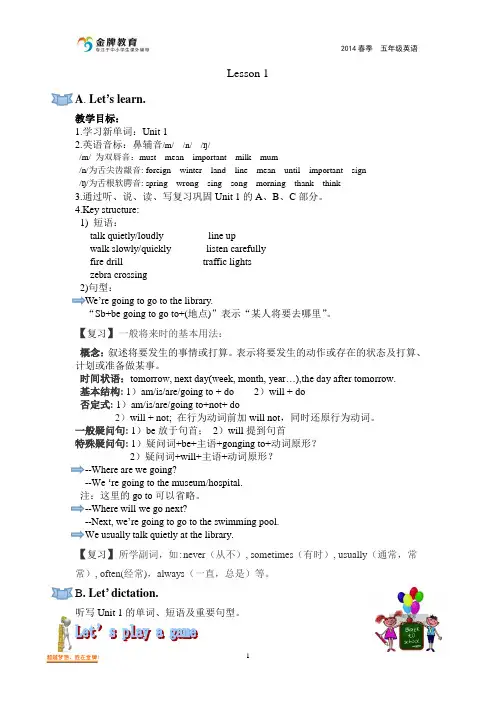
Lesson 1A. Let’s learn.教学目标:1.学习新单词:Unit 12.英语音标:鼻辅音/m/ /n/ /ŋ//m/ 为双唇音:must mean important milk mum/n/为舌尖齿龈音: foreign winter land line mean until important sign/ŋ/为舌根软腭音: spring wrong sing song morning thank think3.通过听、说、读、写复习巩固Unit 1的A、B、C部分。
4.Key structure:1) 短语:talk quietly/loudly line upwalk slowly/quickly listen carefullyfire drill traffic lightszebra crossing2)句型:We‟re going to go to the library.“Sb+be going to go to+(地点)”表示“某人将要去哪里”。
【复习】一般将来时的基本用法:概念:叙述将要发生的事情或打算。
表示将要发生的动作或存在的状态及打算、计划或准备做某事。
时间状语:tomorrow, next day(week, month, year…),the day after tomorrow.基本结构: 1)am/is/are/going to + do 2)will + do否定式: 1)am/is/are/going to+not+ do2)will + not; 在行为动词前加will not,同时还原行为动词。
一般疑问句: 1)be放于句首;2)will提到句首特殊疑问句: 1)疑问词+be+主语+gonging to+动词原形?2)疑问词+will+主语+动词原形?--Where are we going?--We …re going to the museum/hospital.注:这里的go to可以省略。
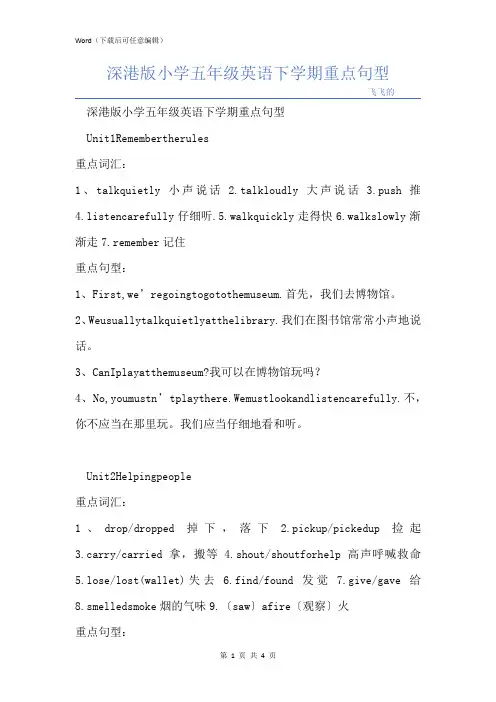
深港版小学五年级英语下学期重点句型飞飞的深港版小学五年级英语下学期重点句型Unit1Remembertherules重点词汇:1、talkquietly小声说话 2.talkloudly大声说话 3.push推4.listencarefully仔细听.5.walkquickly走得快6.walkslowly渐渐走7.remember记住重点句型:1、First,we’regoingtogotothemuseum.首先,我们去博物馆。
2、Weusuallytalkquietlyatthelibrary.我们在图书馆常常小声地说话。
3、CanIplayatthemuseum?我可以在博物馆玩吗?4、No,youmustn’tplaythere.Wemustlookandlistencarefully.不,你不应当在那里玩。
我们应当仔细地看和听。
Unit2Helpingpeople重点词汇:1、drop/dropped掉下,落下 2.pickup/pickedup捡起3.carry/carried拿,搬等 4.shout/shoutforhelp高声呼喊救命5.lose/lost(wallet)失去 6.find/found发觉7.give/gave给8.smelledsmoke烟的气味9.〔saw〕afire〔观察〕火重点句型:1、Whathappened?发生了什么事?2、Idroppedmybags.我掉了袋子。
3、Hepickedupmythings.他捡起我的东西。
4、Hesmelledsmoke.Shesawafire.他闻到烟味。
她看到了火灾。
5、Theyshoutedforhelp.他们大声呼救。
Unit3Changesinourcity重点词汇:1、subway地下铁道2.harbour海港3.bridge桥4.highway公路5.tunnel隧道6.ferrypier渡船码头7.factory工厂8.building建设9.same相同的10.different不同重点句型:1、Wasthereasubway50yearsago?50年前是否有一个地铁站?No,therewasn’t.没有。
深港版⼩学英语五年级上下基本知识,主要词汇及句型[1]1深港版⼩学英语五年级上下主要词汇及句型Book 9Unit 1 Good friends知识点归Words and expressions 单词与词组A 1.fish 钓鱼 /doc/ed0b1e087cd184254b353527.html ke 湖 3. chess 象棋 4. piano 钢琴5. palace 宫殿6. picnic 野餐7. listen 听8. hobby 业余爱好9. spare 空闲的10. boring 乏味的11. understand 理解12. collect 收集13.learn 学习14. popular 受欢迎的15. country 国家16. foreign 外国的17. interesting有趣18. animal 动物19. expensive 昂贵的20. England 英格兰21. worth 值得的22. pound 英镑23. mistake 错误24. Chinese 中国的B. 1. Xili Lake 西丽湖 2. play chess 下棋 3. Children’s Palace 少年宫4.play the piano 弹钢琴5.shopping mall 购物中⼼6.have a picnic 吃野餐7. listen to CDs 欣赏唱⽚8. lots of hobbies 许多爱好9. be not good at 不擅长10.in spare time 在空闲的时间11. after school 放学12. the group leader 组长13. play sports 运动14. collect stamps 集邮15. the 12 Animal Stamp12⽣肖邮票16. be worth 有价值17. stamps with mistakes 错邮票18. upside down 颠倒sentence patterns 句型\1.Like doing sth.喜欢做某事/don’t/doesn’t like doing sth不喜欢做某事。
深圳英语五年级知识点深圳是中国广东省的一个现代化城市,教育资源丰富,英语教育尤为重视。
对于五年级的学生来说,英语的学习已经从基础的听说读写逐渐过渡到更深层次的语言技能和文化知识的掌握。
以下是深圳地区五年级英语的一些重要知识点:词汇积累- 学习与日常生活相关的词汇,如家庭成员、学校设施、日常活动等。
- 掌握基本的形容词和副词,如颜色、大小、形状等形容词,以及时间、地点等副词。
- 学习并运用一些基本的动词短语,如“take care of”(照顾)、“look for”(寻找)等。
语法知识- 掌握一般现在时、现在进行时和一般过去时的用法。
- 学习名词复数形式的变化规则,如规则名词的复数形式通常加“-s”或“-es”,不规则名词的复数形式需要特别记忆。
- 理解并使用基本的疑问句和否定句结构。
阅读理解- 阅读并理解简单的故事、对话或说明文,能够回答基于文章内容的问题。
- 学习如何通过上下文来推测生词的意思。
- 培养快速浏览和寻找特定信息的阅读技巧。
写作技巧- 能够写出简单的自我介绍、日记或小故事。
- 学习如何使用正确的时态和语态来描述事件。
- 掌握基本的写作结构,如开头、发展和结尾。
听力理解- 能够听懂简单的英语对话和短文,理解其主要意思。
- 学习如何捕捉对话中的关键信息,如时间、地点、人物和事件。
- 练习听力时,注意提高对英语口音和语速的适应能力。
口语交流- 能够用英语进行日常交流,表达自己的需求和感受。
- 学习如何使用礼貌用语和表达感谢。
- 练习在不同情境下使用英语,如购物、问路、在餐厅点餐等。
文化知识- 了解一些基本的西方文化习俗,如节日、饮食习惯等。
- 学习英语国家的一些基本地理知识,如主要城市和著名景点。
- 了解英语国家的历史和文化背景,增加对英语语言的理解和兴趣。
通过这些知识点的学习,学生不仅能够提高英语语言技能,还能够增强对英语文化的理解,为将来的深入学习打下坚实的基础。
同时,家长和老师也应该鼓励学生通过多种方式,如英语角、英语戏剧表演等,来实践和巩固所学知识。
深港版小学英语五年级上下主要词汇及句型Book 9Unit 1 Good friends重点词汇:1.fish 钓鱼ke 湖3.boring 乏味的4.hobby 爱好5.spare 空余的6.really 真正的7.learn 学习8.play the piano 弹钢琴9.play chess 下棋10.have a picnic 野餐11.listen to CDs 听音乐12.my friend’s home 我朋友的家13.Children’s Palace 少年宫14.read books 看书15.favourite hobbies 最喜欢的业余爱好16.be good at…… 擅长……重点句型:1、What are you going to do?你打算做什么?I’m going to fish.我打算去钓鱼。
2、What do you do in your spare time?你在空余的时间做什么?3、What are your favourite hobbies?你最喜欢的业余爱好是什么?I like listening to CDs and dancing.我喜欢听CD音乐碟和跳舞。
4. Anyone else?还有别的人吗?Unit 2 Things in the kitchen重点词汇:1.messy 不整洁的2.tidy 整洁的3.yesterday 昨天4.a messy/tidy cupboard 一个乱七八糟/整洁的碗柜5.empty 空的6.empty sink 一个空的洗槽7.a full sink 一个满的洗槽8.a new fridge 一台新冰箱9.an old fridge 一台旧冰箱10.clean/dirty walls 干净/脏的墙11.leave a note 留一张便条重点句型:1、Everything was clean this morning.早上每样东西都很干净。
一.知识点归纳1.重点单词与词组1.film电影 2 .call打电话 3.play玩 4.surf冲浪 5.jump跳 6.hold on 稍等7.horrible 令人厌恶的8. cloud云9.thick厚的10.change 转变11.heavy 重的12weekend 周末2.重点词汇:1、a rainy weekend 一个有雨的周末 2.watch a film 看电影3.surf the Internet 上网 4.finish one’s homework 完成某人的作业5.paint a picture 绘画 6.dance in the living room 在客厅跳舞7.jump on the bed 在床上跳8.hold on 别挂电话9.water the plants 给植物浇水10.many kinds of 许多种11.Hainan Island 海南岛 12. call our friends给我们的朋友打电话13 .listen to music 听音乐14 play the piano弹钢琴15surf the internet上网16 play a game玩游戏17.get….from…从···得到···18.fall down 落下3.重点句型1.What’s the weather like? 天气怎么样?2.We can call our friends or watch a film. 我们可以给朋友们打电话或者看电影。
3.—Hello.你好。
—Hello. This is Pat .Can I talk to Tim, please ?喂,我是帕特,我可以请提姆接电话吗?—Yes , I’ll get him .Hold on.好的,我去叫他,请稍等一下。
4.What did you do this morning? 今天上午你做了什么?5.First I finished my homework. Then I cleaned my room. Now I’mwatching a film. How about you?首先我完成了作业。
一.知识点归纳重点词汇:1、sharp 锋利的 2.fast快速的 3.near 在……附近4.maybe 也许5.have sharp teeth 有锋利的牙齿6.run fast 跑得快7.walk slowly 走得慢8.eat plant / meat / fish 吃植物/肉/鱼9.drink a lot of water 喝许多水10.live near lakes 生活在湖附近11.have four legs 有四条腿12.on the earth / land在地球/陆地上13.long time ago 很久以前14.in the air / sky 在空中重点句型;1、It has sharp teeth.它有锋利的牙齿。
2、It eats plants.它吃植物。
3、It doesn’t fly or swim.他不会飞也不会游泳。
4、It ran but it didn’t fly.他会跑但不会飞。
5、This dinosaur ate fish.这只恐龙吃鱼。
6、Dinosaurs lived on the Earth a long, long time ago.很久以前恐龙生活在地球上。
7、Some walked on the land , some flew in the air and some swam in lakes.一些在陆地上走,一些在天空中飞,一些在湖里游。
8、There was no food or water for dinosaur.恐龙没有了食物和水。
语法一般过去时态的基本用法:(1) 一般过去时态表示过去发生的动作或存在的状况,也可以表示过去的习惯,爱好.常与表示过去的时间副词连用,如:an hour ago, yesterday, last Sunday/month, just now等.含有行为动词的一般过去时态,助动词did没有人称和数的变化,其结构是: did+动词原形.例: He went to school yesterday.He didn't go to school yesterday.(否定句)Did he go to school yesterday?(一般疑问句)(2)动词的一般过去式的变化原则: a. 规则动词的变化: b. 不规则动词的变化: do-did, is/am-was, are-were, drive-drove, eat-ate, have-had, drink-drank, ride-rode, run-ran, swim-swam, fly-flew, stand-stood, come-came, go-went, become-became, see-saw, hit-hit, put-put, hurt-hurt, get-got, forget-forgot, sleep-slept, sweep-swept, think-thought, bring-brought, catch-caught, teach-taught, buy-bought, tell-told, say-said, sing-sangThey all died. (它们都灭绝了.) "all" 用于三者或三者以上都... 例:The students are all in the classroom."both" 仅用于两个人或两件事,表示两者都...例:My mother and father are both teachers. Maybe the Earth became very cold. (可能地球变得很冷.)"maybe"表示"也许,可能",是副词,在句中作状语,常位于句首,相当于"perhaps".而在"...may be ..."结构中,may是情态动词,be是系动词,二者合起来共同作谓语:例:Maybe your ruler is on the bed.=Your ruler may be on the bed.(也许你的尺子在床上.)There was no food or water for dinosaurs. (那时候,恐龙没有食物和水.)此句中,no food or water 相当于no food and no water.But the fish were afraid of him. (但是鱼很害怕他.)(1) be afraid of 表示"害怕..."例:I'm afraid of dogs.(我怕狗.)(2) be afraid to do sth. 表示"不敢做..."例: Her sister is afraid to go out at night。
矿产资源开发利用方案编写内容要求及审查大纲
矿产资源开发利用方案编写内容要求及《矿产资源开发利用方案》审查大纲一、概述
㈠矿区位置、隶属关系和企业性质。
如为改扩建矿山, 应说明矿山现状、
特点及存在的主要问题。
㈡编制依据
(1简述项目前期工作进展情况及与有关方面对项目的意向性协议情况。
(2 列出开发利用方案编制所依据的主要基础性资料的名称。
如经储量管理部门认定的矿区地质勘探报告、选矿试验报告、加工利用试验报告、工程地质初评资料、矿区水文资料和供水资料等。
对改、扩建矿山应有生产实际资料, 如矿山总平面现状图、矿床开拓系统图、采场现状图和主要采选设备清单等。
二、矿产品需求现状和预测
㈠该矿产在国内需求情况和市场供应情况
1、矿产品现状及加工利用趋向。
2、国内近、远期的需求量及主要销向预测。
㈡产品价格分析
1、国内矿产品价格现状。
2、矿产品价格稳定性及变化趋势。
三、矿产资源概况
㈠矿区总体概况
1、矿区总体规划情况。
2、矿区矿产资源概况。
3、该设计与矿区总体开发的关系。
㈡该设计项目的资源概况
1、矿床地质及构造特征。
2、矿床开采技术条件及水文地质条件。